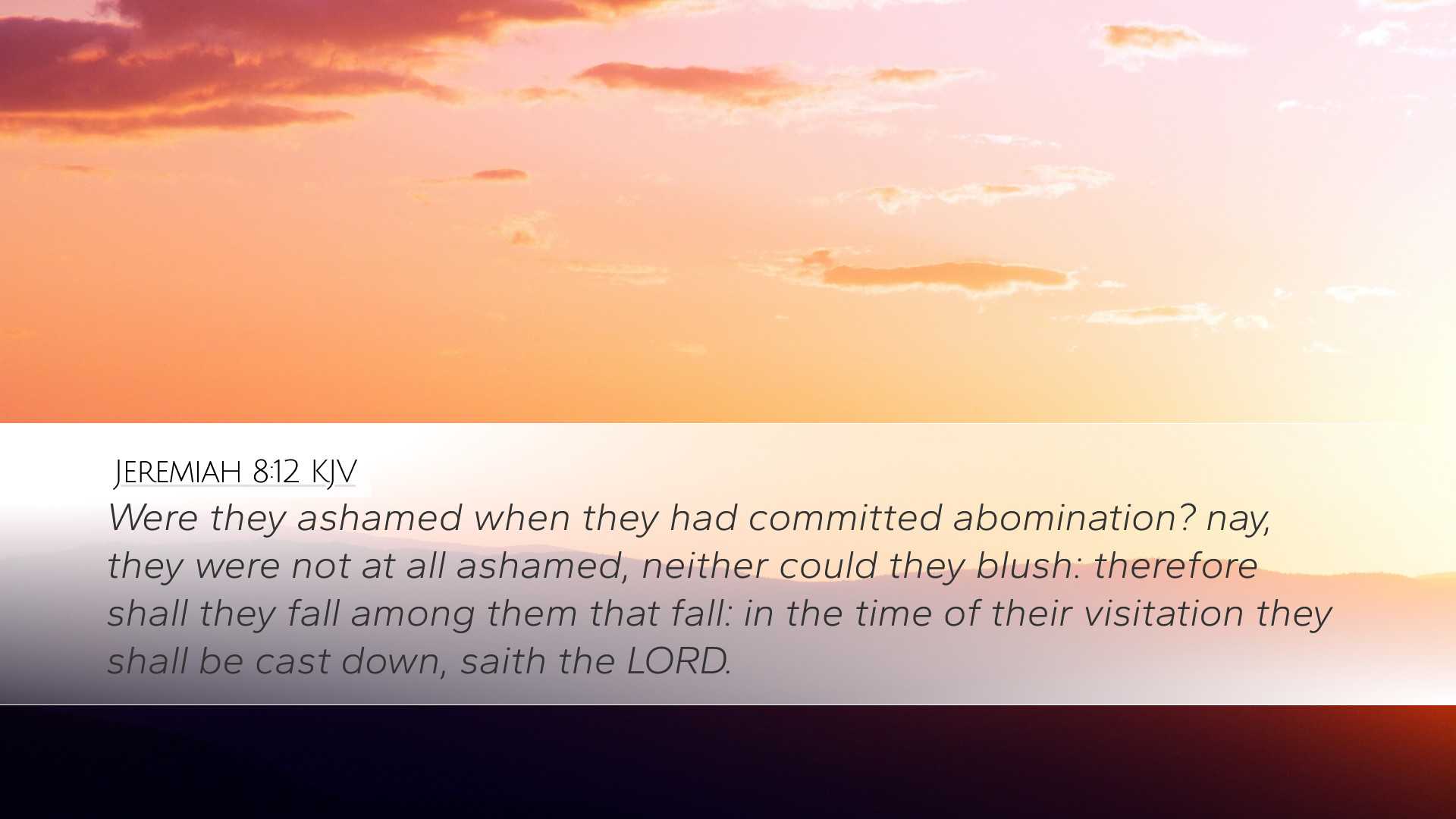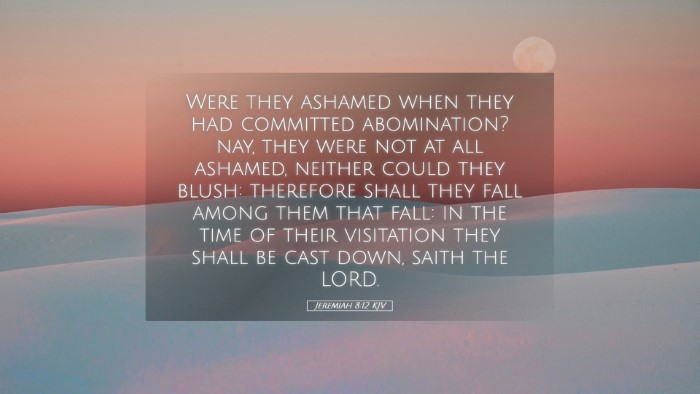Bible Commentary on Jeremiah 8:12
Verse: Jeremiah 8:12 - "Were they ashamed when they had committed abomination? nay, they were not at all ashamed, neither could they blush: therefore they shall fall among them that fall: at the time that I visit them they shall be cast down, saith the LORD."
Insights from Public Domain Commentaries
Matthew Henry's Commentary
Matthew Henry notes the profound moral decay evident in the society addressed by Jeremiah. He emphasizes the blatant disregard for sin's consequences, stating that the people are unashamed of their abominations. This lack of shame reflects a heart hardened against God's call to repentance. Henry underscores that such a state of moral apathy leads inevitably to judgment, as God cannot tolerate sin forever.
Henry further explains that the people have not only committed vile acts but have also lost the ability to feel remorse or guilt. The phrase "neither could they blush" indicates a complete loss of sensitivity to wrongdoing. Henry reflects on the seriousness of this spiritual condition, drawing parallels between societal norms that permit sin and the inevitable decline into judgment faced by communities that reject divine standards.
Ultimately, Henry warns that God's visitation comes as a corrective measure for such communities, and he articulates a deep concern for the spiritual fate of those who continue in rebellion against God. The passage calls for a return to genuine humility and contrition before a holy God.
Albert Barnes' Notes on the Bible
Albert Barnes offers a critical exploration of the societal context during Jeremiah's prophecy. He highlights that the people's lack of shame corresponds to their deep-seated secularism and idolatry. Barnes articulates that the absence of remorse among the Israelites signifies extreme moral corruption, akin to the nations surrounding them who also turned their backs on the living God.
Barnes elaborates on the theological implications of the text, emphasizing God's holiness and justice. He points out that the phrase "therefore they shall fall among them that fall" illustrates divine justice being executed in a manner that aligns with the principles of retribution within a covenantal framework. For Barnes, this passage serves as a stark reminder of the consequences of ignoring God's laws and a call for national repentance.
Furthermore, he posits that the "time of visitation" signifies a moment when God's attention to humanity’s actions results in decisive action. The assurance that they will be "cast down" serves as a warning to heed God's call and reflect on personal and collective sinfulness.
Adam Clarke's Commentary
Adam Clarke's exposition of this verse delves into the psychological aspect of shame and guilt. He notes that shame is an inherent part of human nature, but when it is absent, it suggests a desensitization to sin. Clarke argues that the utter lack of remorse implies a people who have been "given over" to their sinful ways, echoing New Testament themes of divine abandonment seen in Romans 1.
Moreover, Clarke emphasizes that the absence of blushing signifies a profound spiritual sickness within the nation. He connects this moral insensitivity with the prophetic warning of coming judgment, suggesting that the people's fate is sealed unless there is a demonstrable change of heart.
Clarke further elaborates on the historical context of the Israelites, drawing attention to their repeated rebellion against God's statutes. He warns that the societal norms that celebrate sin, rather than condemn it, further immunize individuals against the feelings of guilt and remorse that might otherwise lead them toward repentance.
Theological Reflections
Throughout the commentaries, a consistent theme emerges regarding the nature of shame and its relevance to faith. The biblical portrayal of unashamed sin highlights the gravity of moral decay within society. As modern-day readers reflect on this passage, it challenges their own communities' attitudes towards sin and repentance.
- Understanding Shame: Shame serves as a critical component of spiritual and moral awareness. It indicates a sense of accountability before God and others.
- Call to Repentance: The absence of shame prompts a call to action for both individuals and communities to reassess their moral standings and seek divine forgiveness.
- Consequences of Sin: Recognizing that there are repercussions for unrepentant hearts should motivate believers to foster a culture of openness about sin and redemption.
- Role of Prophetic Revelation: Jeremiah's role as a prophet emphasizes the importance of voices calling for righteousness in an age of moral decay.
Conclusion
The insights gleaned from the commentaries on Jeremiah 8:12 serve as a poignant reminder of the dangers of a callous heart. Pastors, students, theologians, and Bible scholars are challenged to consider not only their understanding of sin but also how to address the pervasive issue of moral apathy in a contemporary context. As the church engages with the world, it must strive to rekindle a sense of awareness regarding the profound impact of sin and the necessity of genuine contrition before the all-holy God.


